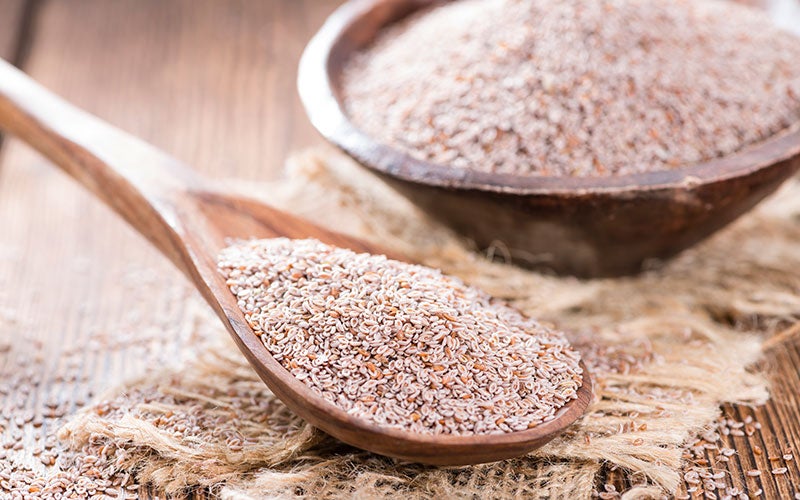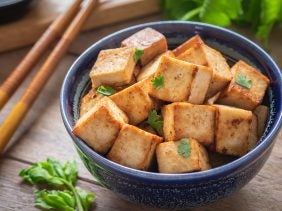Psyllium Husks are a Dietary Fibre Powerhouse
 ©HandmadePictures
©HandmadePictures
Once seen as the fare of older people, fibre supplementation is enjoying a fandom among health-conscious adults as well as athletes. And it’s no wonder, given fibre’s credentials. And among the fibre supplements, psyllium husk is at the top of the list. We’ve got the low-down.
Why is fibre so important?
In case you need a nutrition refresher, fibre is a type of carbohydrate that comes from plants and is indigestible. As you know, carbohydrates are typically what the body uses for energy. “Fibre comes in two varieties, both beneficial to health,” according to the Harvard T.H. Chan School for Public Health. “Soluble fibre, which dissolves in water, can help lower glucose levels as well as help lower blood cholesterol… Insoluble fibre, which does not dissolve in water, can help food move through your digestive system, promoting regularity and helping prevent constipation.”
And it’s not just a boon to bowel movements. Fibre can change the GI tract flora, which means it helps your gut microbiome, according to researchers at the University of Illinois. There’s more. “The health benefits of dietary fibre include the prevention and mitigation of type 2 diabetes, cardiovascular disease, and colon cancer,” they write. “By modulating food digestion, digestion, absorption, and metabolism, dietary fibre reduces the risk of hyperlipidemia [high triglycerides, a type of fat in the blood], hypercholesterolemia, and hyperglycemia. Emerging research has begun to investigate the role of dietary fibre in immunomodulation” — meaning it helps regulate the immune system. And if that is the case, fibre could be seen as a way to help prevent infection, and help with cognitive processes like memory and even mood.
These supplements will help keep your body on tip-top form
And if you’re concerned about breast cancer risk, or other estrogen-dependent cancers, upping your fibre intake isn’t a bad idea. A paper published in the journal Cancer that looked at 20 studies on the subject found that women who ate the most fibre were 8% less likely to be diagnosed with breast cancer compared with the women who had the least. This was true for both premenopausal and postmenopausal women. And there was something else interesting going on. When people focus on fibre from various sources, it also meant they were getting a variety of minerals, vitamins, phytoestrogens, “and other bioactive compounds known to support estrogen metabolic pathways,” a process to describe how the body maintains good levels of estrogen, versus too much.
Related: health benefits of kale
The daily recommended amount of fibre goes down with age. For women younger than 50, it’s 25 grams per day, and 51 and older is 21 grams per day. For men younger than 50, it’s 38 grams per day, and for 51 and older is 30 grams per day. Barley, lentils, garbanzo and kidney beans, potatoes, lima beans, nuts and seeds, leafy and root vegetables, cruciferous vegetables like brussel sprouts and broccoli, and fruit including blueberries and cherries are all good sources of fibre.
How to fit psyllium husk into your diet
For a lot of people, getting enough fibre into their diet every day is challenging. That’s when a supplement, such as psyllium husk, might make sense. Psyllium husk, a soluble fibre, has an extremely high swelling capacity. As soon as it comes into contact with liquids in the digestive tract, it binds with the liquid and swells up. Psyllium husk can absorb about 40 times its own weight in water. For comparison, chia seeds absorb about 7 to 12 times their own weight. The nutrition facts for psyllium husk powder vary slightly, but a tablespoon contains about 7 grams of fibre.
Psyllium husk husks also release mucilage in the gastrointestinal tract. Mucilage is a body fluid, like what comes out of your nose, and is excreted in the digestive tract to help with its function. The outer layer of psyllium husk consists of polysaccharides (long-chain sugars). These take on a gel-like consistency when they get wet. It’s also why psyllium husk is used in a lot of gluten-free bread recipes, since it creates the kind of bind that is missing when you take out the gluten. Most of the mucilage is not broken down as it passes through the intestines.
If you take medication, talk to your doctor before taking psyllium husk, since the fibre might blunt the effectiveness of the meds.
What other nutrients does your body need? Find out here!
What is psyllium husk good for?
It’s often used as the main ingredient in over-the-counter laxatives since it treats constipation. The swelling capacity of psyllium husk increases the volume of the stool and stimulates intestinal activity. In combination with sufficient water, the secreted mucilage acts like a lubricant and makes the transport of the stool in the intestine smoother. (In other words, it makes it easier to go number two.) And that mucilage helps protect irritated and inflamed areas in the GI tract.
Plus psyllium husk contains flavonoids, a type of antioxidant used to fight free radicals, which are harmful to the body.
Related: pistachio — so much more than a superfood
How can I take psyllium husks?
Generally, it comes as a powder that you stir into a drink (usually water), or as capsules. If you are gulping it in a glass, make sure to use enough water, and drink it fairly quickly. As the psyllium spends time in liquid, it becomes gloopy and is a choking hazard. Make sure to have it with sufficient water, and if you’re having trouble swallowing, do not fight through it. Better to mix in small amounts of psyllium husk powder and drink it in a couple glasses of water. You can try mixing the powder into yogurt, oatmeal, or muesli as well. Psyllium husks also come in capsules, and you should follow package directions to make sure you’re not taking in too much at once, and having sufficient liquid, too. (In addition to choking risk, you could also give yourself quite some GI distress.) And add psyllium husk into your diet slowly. A heads up that tummy rumbling, cramps and passing gas might be side-effects of your body getting used to the added fibre, but it should resolve in a few days.
And don’t overdo the psyllium husk. Because it makes the digestive system move, it can also curb the amount of nutrition from food that you absorb. If you’re using it to help minor digestive problems, go slow and give it time. While some notice a significant improvement within a few hours with minor digestive problems, for others it takes up to three days for the intestines to benefit from the positive properties of the husks.
Psyllium husk doesn’t work for everyone. The taste is neutral but not very nice, and some people might find it causes too many gastrointestinal issues. If that’s you, ripe bananas might be a good alternative. The ones that are getting brown have lost starch as they’ve ripened and can help with a variety of digestive ailments.
More healthy living tips from foodspring:
- Summer Meal Ideas to Stay Cool
- 14 Easy High-Protein Breakfast Ideas
- 12 foods for muscle building that you should always keep in your pantr
Sources for this article
We at foodspring use only high-quality sources, including peer-reviewed studies, to support the facts within our articles. Read our editorial policy to learn more about how we fact-check and keep our content accurate, reliable, and trustworthy.
- (2) Jalanka, J.; Major, G. et al. (2019): The Effect of Psyllium Husk on Intestinal Microbiota in Constipated Patients and Healthy Controls, in: International Journal of Molecular Sciences, 20 (2).
- (3) Uehleke, B.; Ortiz, M.; Stange, R. (2008): Cholesterol reduction using psyllium husks – do gastrointestinal adverse effects limit compliance? Results of a specific observational study, 15 (3).
- (4) Noureddin, S.; Mohsen, J.; Payman, A. (2018): Effects of psyllium vs. placebo on constipation, weight, glycemia, and lipids: A randomized trial in patients with type 2 diabetes and chronic constipation, in: Complementary therapies in medicine, 40 (1).
- (5) DGE: Referenzwerte Wasser, https://www.dge.de/wissenschaft/referenzwerte/wasser, [01.11.2020].
































